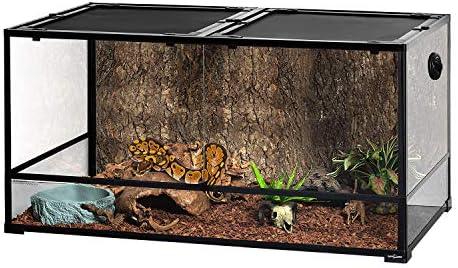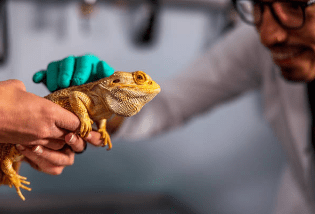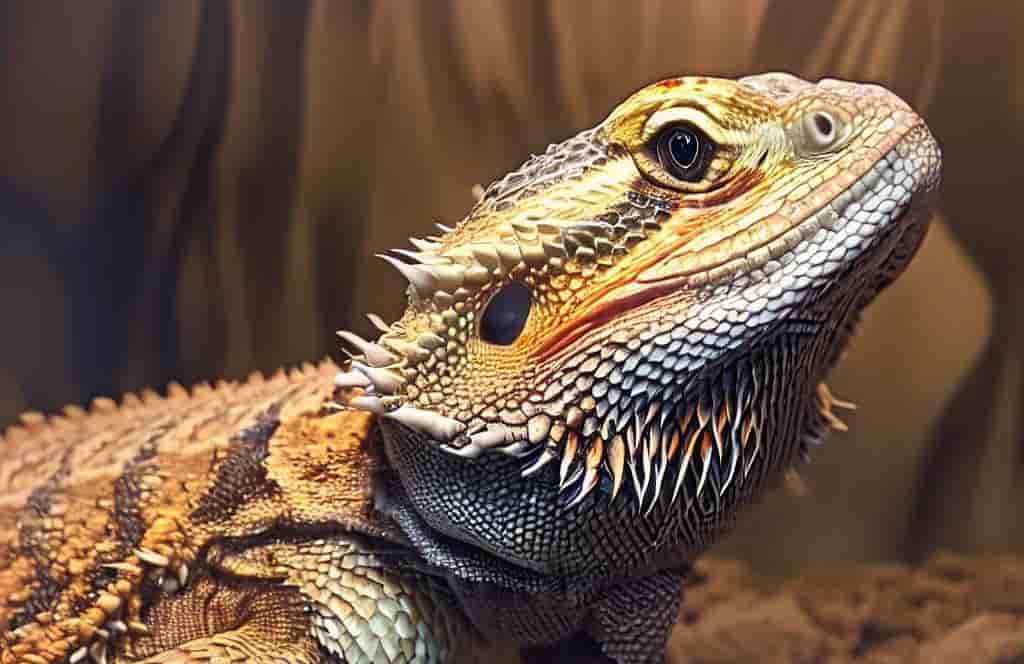Hey there, bearded dragon enthusiasts!
Curious about why your bearded dragon’s eyes look different? I totally get you.
As a reptile expert, I can assure you that keeping an eye on their eyes (pun intended!) is crucial.
Bearded dragons can experience a variety of eye issues that may make you a tad nervous. From droopy to swollen eyes, these reptilian beauties are prone to an array of challenges that require keen observation.
So sit tight, and let’s dive into the fascinating world of bearded dragon eye problems, shall we?
Your scaly friend’s well-being is our top priority!
Table of Contents
Common Bearded Dragon Eye Problems
Alright, so what’s the lowdown on those peepers? Bearded dragon eyes are complex and can signal an underlying issue that you might not spot right away. These problems range from mild to severe and need different approaches for treatment.
Droopy Eyes
Is your bearded dragon giving you sad, droopy eyes? This is a common issue but not one to be ignored. Droopy eyes are usually a symptom of an underlying issue that needs immediate attention.
Causes:
- Dehydration: Lack of water intake can lead to droopy eyes.
- Nutritional deficiency: Lack of essential vitamins and minerals.
Symptoms:
- Lowered eyelids: Healthy bearded dragon eyes should be alert and clear.
- Reduced activity: Your bearded dragon may appear less active.
Treatment:
- Hydration: Provide fresh water to your pet.
- Dietary changes: Consult a vet for a balanced diet plan.
Sunken Eyes
Worried about your bearded dragon’s sunken eyes? This condition is another red flag that needs your attention. Sunken eyes often indicate severe dehydration or malnourishment.
Causes
- Lack of hydration: Not enough water can cause eyes to sink.
- Poor nutrition: Inadequate vitamin and mineral intake.
Symptoms
- Hollow appearance: Eyes may appear sunk into the head.
- Lethargy: Bearded dragon may be less responsive.
Treatment
- Hydration therapy: Rehydrate your pet with oral fluids to ensure healthy bearded dragon eyes.
- Dietary supplements: Introduce vitamins and minerals as per the vet’s advice.
Bulging Eyes
Bulging eyes can be shocking to see but don’t freak out just yet. While often normal, especially when shedding, sometimes it can signal something more serious.
Causes
- Shedding process: A natural cause of eye bulging.
- Infections: Could be bacterial or parasitical in nature.
Symptoms
- Eyes protruding out: More than the usual eye shape.
- Behavioral changes: Restlessness or scratching at eyes.
Treatment
- Monitor shedding: Keep an eye out for complete shedding.
- Antibiotic treatment: In case of an infection, consult your vet.
Swollen Eyes
Yikes, are those bearded dragon eyes looking a bit puffy? Swollen eyes can indicate various issues ranging from infections to physical injuries.
Causes
- Bacterial infection: Can lead to swollen eyes.
- Physical trauma: An injury can cause puffiness.
Symptoms
- Eyes appear larger: With a possible discharge.
- Discomfort: Your pet may try to rub its eyes.
Treatment
- Antibiotics: Consult your vet for appropriate medication.
- Cold compress: For immediate relief until vet visit.
Dry Eye
Nobody likes dry eyes, not even your bearded dragon. Dry eye is uncomfortable and can be caused by multiple factors such as poor habitat conditions.
Causes
- Low humidity: Insufficient moisture in the environment.
- Inadequate water: Not enough hydration for your dragon.
Symptoms
- Flaky skin around eyes: With possible redness.
- Squinting: Your bearded dragon might squint its eyes.
Treatment
- Humidifier: To maintain an optimal living environment.
- Hydration: Ensure fresh water is available at all times.
Conjunctivitis
Got a case of pink eye in your dragon? Conjunctivitis, or pink eye, is an inflammation of the eye’s outer layer and can be quite irritating for your pet.
Causes
- Bacterial infection: Likely to cause red, itchy eyes.
- Dust and debris: Can irritate the eyes leading to inflammation.
Symptoms
- Redness: With a potential eye discharge.
- Scratching: Your dragon may frequently rub its eyes.
Treatment
- Antibiotic eye drops: Consult your vet for the best options.
- Cleaning: Keep the eyes clean with saline solution.
Eye Infections
You certainly don’t want your dragon dealing with an eye infection. These are usually bacterial in nature and can worsen if untreated.
Causes
- Contaminated water: Can introduce bacteria into the eyes.
- Poor hygiene: Dirty habitats can cause infections.
Symptoms
- Cloudy appearance: A hazy look in one or both eyes.
- Frequent eye-closing: Your pet may keep its eyes shut.
Treatment
- Antibiotics: An antibiotic ointment or drops may be needed.
- Clean environment: Make sure your dragon’s habitat is clean.
Corneal Ulcers
Your dragon’s eyes looking a bit cloudy? It might be dealing with corneal ulcers. This condition involves the scratching or ulceration of the eye’s outer layer.
Causes
- Physical injury: Such as scratches or dust.
- Bacterial infection: Can cause ulceration.
Symptoms
- Cloudy eyes: With possible discharge.
- Pain: Your pet may appear uncomfortable.
Retained Shed
Did your dragon’s last shed seem incomplete? Retained shed on the eyes can be irritating and needs to be addressed.
Causes
- Incomplete shedding: Leading to skin stuck on the eyes.
- Low humidity: Can make shedding difficult.
Symptoms
- Excess skin: Around the eyes post-shedding.
- Irritation: Your pet might try to rub its eyes.
Treatment
- Humidity: Maintain optimal humidity levels.
- Gentle removal: Consult your vet on how to safely remove skin.
Eye Injuries
Accidents happen, and eye injuries can be particularly alarming. Whether it’s a scratch or a bump, immediate attention is required.
Causes
- Physical trauma: Like running into objects or fights.
- Foreign objects: Such as dust or substrate particles.
Symptoms
- Swelling: Around the affected eye.
- Behavioral changes: Your dragon may act more agitated.
Treatment
- Veterinary care: A vet should examine the eye for damage.
- Cold compress: For immediate relief.
Cataracts
While rare, cataracts can occur in bearded dragons. These cause a cloudy appearance in the eyes and often signify aging.
Causes
- Aging: Most common cause in bearded dragons.
- Genetic predisposition: Some dragons are more susceptible.
Symptoms
- Cloudy eyes: A milky appearance.
- Reduced vision: Your pet may bump into objects.
Treatment
- Surgical intervention: In severe cases, surgery may be an option.
- Special care: Consult your vet for proper care and treatment.
Eye Tumors
Even more rare but not impossible, eye tumors are a severe health risk. These are usually malignant growths around the eyes.
Causes
- Genetic predisposition: Though very rare, it’s possible.
- External factors: Like exposure to harmful substances.
Symptoms
- Lump or growth: Around the eye.
- Behavioral changes: Like reduced activity or obvious discomfort.
Treatment
- Surgical removal: Consult your vet immediately.
- Postoperative care: Like antibiotics and pain relief medication.
Incomplete Eye Closure
If your bearded dragon struggles to close its eyes fully, this is a condition known as incomplete eye closure. This could be a sign of various issues, including neurological problems.
Causes
- Neurological disorder: Affecting the muscles around the eyes.
- Injury: That affects the ability to close the eyes fully.
Symptoms
- Partial eye closure: Even while sleeping.
- Dry eyes: Due to incomplete closure.
Treatment
- Neurological tests: Conducted by a vet.
- Medications: To manage the condition based on vet advice.
Genetic Eye Conditions
Finally, some bearded dragons suffer from genetic eye conditions. These are usually inherited and can range from minor to severe issues.
Causes
- Inherited: Passed down from parent dragons.
- Genetic mutations: Sporadic occurrences that lead to eye issues.
Symptoms
- Various: Depending on the specific condition.
- Lifelong issues: These may require ongoing treatment.
Treatment
- Genetic counseling: To understand the condition.
- Ongoing care: Based on veterinary advice.
Preventive Measures for Bearded Dragon Eye Health
So, how can you keep those dragon eyes sparkling? Preventive measures are the cornerstone of any health plan, and it’s no different for your bearded dragon.
Proper Habitat Setup
The right habitat is key for preventing eye issues. A poor habitat setup is a primary culprit behind many eye problems, including bearded dragon swollen eyes. Opt for substrates like reptile carpet over sand, which can be irritating. Also, ensure that the enclosure has no sharp edges that can lead to eye injuries.

Appropriate Lighting and Temperature
Inappropriate lighting can cause bearded dragon droopy eyes. Therefore, proper lighting and temperature are essential. Be sure to use reptile-specific UVB bulbs, and keep an eye on temperature levels to make sure they’re within the recommended range for bearded dragons.
Maintaining Clean and Hygienic Conditions
A dirty habitat can lead to bacterial infections and consequently, bearded dragon swollen eyes. Regular cleaning, including daily waste removal and weekly disinfection, is crucial to keep those peepers clear and bright.
Avoiding Irritants and Harmful Substances
Avoid using cleaning agents or decorations that could irritate your bearded dragon’s eyes. Substances that are safe for humans are not always safe for reptiles, and taking chances could result in bearded dragon droopy eyes.
Regular Eye Examinations and Monitoring
Routine check-ups are essential for early detection of eye problems, especially if you’ve previously noticed symptoms like bearded dragon droopy eyes.
Diagnosing Bearded Dragon Eye Problems
A professional examination by a vet can provide a precise diagnosis and appropriate treatment plan. If you spot signs like bearded dragon swollen eyes or droopy eyes, prompt veterinary attention is advised.
Treatment Approaches
Finally, let’s talk treatments. Different issues require different approaches, but early intervention is key in all cases.
Medications and Topical Treatments
If you’re facing issues like bearded dragon droopy eyes or other minor irritations, topical treatments could be the first line of defense. These are typically ointments or creams that can be applied directly to the eye. Always consult your vet before using any medication to ensure it’s suitable for your pet.

Antibiotics
In case of bacterial infections that often manifest as bearded dragon swollen eyes, antibiotics are a common course of treatment. Your vet will usually prescribe antibiotic eye drops or ointments that need to be administered for a specific period.
Eye Drops and Ointments
Particularly for conditions like bearded dragon droopy eyes, special eye drops can offer immediate relief. These drops can lubricate the eye and might contain medications to treat underlying issues. However, long-term usage should only be done under veterinary supervision.
Pain Relief Medications
For conditions requiring surgical intervention or for traumatic injuries, pain relief medications may be necessary. This could range from oral medications to injectable pain relievers, depending on the severity of the condition.
Home Remedies
If you’re dealing with minor issues, like the early stages of bearded dragon droopy eyes, home remedies may provide some relief. For example, a chamomile tea rinse can offer a soothing effect.
However, always consult your vet before trying any home remedy, particularly if you’re already noticing symptoms like bearded dragon swollen eyes.
Conclusion
Caring for your bearded dragon‘s eyes is essential for their overall well-being. Keep an eye on those eyes, apply preventive measures, and consult a vet when needed.
Your scaly friend’s eyes are windows to their health. A proactive approach today can help avoid serious eye issues down the line. Happy dragon parenting!
FAQs
What should I do if I notice my bearded dragon has swollen eyes?
If you notice your bearded dragon has swollen eyes, consult your vet immediately for a proper diagnosis and treatment plan. Swollen eyes can be a symptom of multiple underlying issues, from infections to poor habitat conditions.
Can I use human eye drops for my bearded dragon’s droopy eyes?
It’s not advisable to use human eye drops for bearded dragon droopy eyes without consulting a vet. Different species have different eye care needs, and what works for humans may not be appropriate for your bearded dragon.
How often should I get my bearded dragon’s eyes checked?
A yearly veterinary check-up is generally sufficient, but immediate consultation is advised if you notice symptoms like droopy or swollen eyes.
Alina Hartley is a small-town girl with a ginormous love of bearded dragons. It all started with Winchester, a baby bearded who was abandoned at the shelter by his former owners because of a birth defect that caused one front leg to be shorter than the other. Alina originally went to the shelter looking for a guinea pig, but one look at Winchester and it was love at first sight. From that day on, Alina has dedicated her life to learning everything she can about bearded dragons. She loves helping new beardie parents start their incredible journey with these magnificent reptiles.
Follow her on:
LINKEDIN
TWITTER.
Read her latest articles HERE
Learn more about her HERE.

